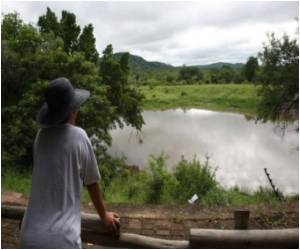Papyrus reeds in Gabon's Lake Anengue cut off villages around it from access to the outside world so much so that many people have left their homes and gone away.

"Anengue has lost its reputation as the food store for Port Gentil," the oil city on Gabon's southern Atlantic coast, Douglas said.
Villages such as Issinga, Foulameyong, Tchieguifuala, Bissoma, Ipedi and Paguielou, which were known for their farm produce, have been losing people, and about 2,700 residents now live in 26 villages by the lake.
Three hours by dug-out canoe from Port-Gentil, Lake Anengue, located some 90 kilometres (55 miles) from the Ogooue delta, is lost in the middle of a vast equatorial forest.
Owonga, a passage between the tall papyrus reeds, is the only way in and out of the lake.
"When the passage is closed, we're cut off from the whole province," said Guy Martial Tsoutsi Kassa, boatman and fisherman.
Advertisement
"This situation punishes us all. The farmers find it difficult to sell their harvest. The buyers have difficulty in taking produce to the big markets in Port-Gentil. The river transporters can't make a living," said Philomene Mouzengou, a trader who comes to buy goods from the locals to take them to Port-Gentil.
Advertisement
In 2005, Gabon's cabinet was moved by the situation and stressed "the deep concern and compassion of the authorities," recalled Theophile Moussouvou, who comes from a lakeside village.
"A joint government and parliamentary mission stayed here, to take account of the obstruction to the entrance. Now, we're in 2010. Nothing has been done," he added.
"For nearly three years, the departmental council has been carrying out operations (to chop down the reeds)," said a civil servant who asked not to be named. "With heavy machinery, we frequently open the passage."
But it is a task that needs to be started again almost as soon as it is finished and the persistence and perpetual return of the tough papyrus plant, which can grow up to three metres (10 feet) tall, has given rise to local legends.
Some say that it is the work of the genie Olemboue, who wants to get his wife back after she was stolen away by another genie.
"When he feels the presence of his rival around the lake, he rushes to close Owonga, to try to trap his rival and recover his spouse," recounted the elder Marc Aperano, in his sixties.
To soothe the anger of the jealous genie, "we organise rituals during the season of heavy rains. When there is thunder, we beg his indulgence by offering in exchange food, wine and suchlike. After the rains, the entrance is free of the papyrus plants," he insisted.
Source-AFP









